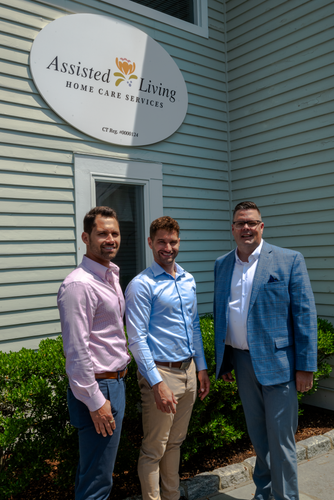Demand for eldercare across the entire US is on the rise. The work involved is difficult to automate and often takes a toll on the frontline caregivers who work in both assisted living facilities and the homes of clients.

“Within the next 10 years there’s going to be a significant amount of individuals who will need home care,” explained Chief Operating Officer of Assisted Living Services and Senior Vice President of Assisted Living Technologies Mario D’Aquila. “They call that the ‘Silver Tsunami.’”
D’Aquila said that the upcoming mismatch between the needs of an aging population and a critical workforce was one of the biggest concerns for both Connecticut and the United States at large. He also noted that within that market there is an array of needs, extending from those staying in their homes but needing additional help to those moving into full-time assisted living facilities as their needs grow. At both ends of the spectrum Assisted Living Technology is poised to provide health monitors, alarm systems, and automated medication dispensers that can make life easier for caregivers and the cared-for alike.
Mario, and his brother Nick who is the chief information officer of ALS and also a vice president at Assisted Living Technologies, felt that ALS is uniquely suited to handling the upcoming “tsunami” thanks to the family-owned business’ emphasis on recruiting and retaining top talent among caregivers.
“This is the woe of many home care agencies,” Mario said. He explained that ALS has placed an emphasis on producing “raving fans” not only among customers and clients, but with their employees as well. He cited the company’s Platinum Caregiver program, which distributes $1,000 checks to five caregivers in recognition for excellent service every month as a key tool.
“We wanted to really reward caregivers that went way above and beyond for these folks in their homes,” Nick explained. He also noted that the monthly event helped position ALS favorably in other quarters as well. “By announcing it we make sure all the carers know, and all of our clients know that these people are really supporting them. It’s good to let other people know out in the industry that they’re doing a great job.”
They believe that the strategy has played an important role in keeping the ALS workforce staffed with experienced caregivers.
“Caregivers last generally like less than a year,” Mario said. “Our company? We have caregivers that have been working for us for over 20 years and our average length of stay for caregivers is at least five years.”
The brothers indicated that ALS is eyeing Fairfield County as a useful market to expand into, offering an attractive mix of high-income customers and Medicaid customers who represent a reliable and consistent base for the company.
To bolster that push, the company has been revamping its Westport offices and bringing on not only new caregivers but additional management.
Christopher LaRiviere was hired as a Regional Director for ALS in May. He brings 15 years of experience in the field including the launch and sale of his own start-up. He feels prepared for the position in part because of the company’s excellent recruiting and retention policies.
“Having worked for at least two other home care agencies, one as part of a very large health system, I can say that there is not another home care agency in Connecticut that does more for their employees than Assisted Living does,” La Riviere said.
LaRiviere said that many people had a misconception that the industry was defined by the “Nightingale Effect” where people rise to the occasion of caring for another to the point of sacrifice. Instead, he said, companies like ALS succeed because they find “that sort of happy medium of where logistics meet someone’s chosen path.”
He sees his role as facilitating those logistics and support to encourage quality care from those at the “front.”
“That’s vital in this industry where there’s been so much trouble trying to find the people to provide that care, because you need all your people in the frontline. This isn’t a field where you can purely lead from the back and have people figure it out.”



















